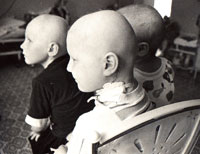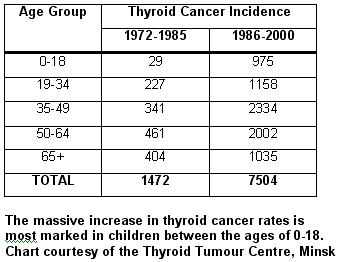A Chornobyl [Chernobyl] Poem; Information On Living With Thyroid Cancer; The UNICEF Report On Iodine And Thyroid Cancer; And A Donation Opportunity

REMEMBER
By Helen Walker
In Memory of Evgeniya
7/2/95
Remember the victims:
The victims of Chernobyl;
Evgeniya and Uri and Igor.
Remember their faces;
Their hair and their eyes,
Keep them in your heart.
"Well", you say, "I don't know what they looked like."
But you do. You may not think you do,
But you do.
Deep down inside
You know.
Try this:
Close your eyes and think hard.
Imagine a child just like you,
Of about the same age,
And about the same height;
Of about the same build,
With about the same hair.
With about the same hopes and ideas,
Only their hopes were dashed one day.
It could have been you but it wasn't.
It was somebody else.
Somebody died instead of you.
This doesn't make it your fault,
But you must always remember them.
Always remember that someone like you.
It could have been you in that hospital bed
But it wasn't.
It was somebody else.
There are many people just like you,
That are suffering because of the wind.
Because of the wind that blew their way
On that fateful day in 1986.
You can help them.
(c) Helen Walker
http://www.chernobyl-international.com/aboutchernobyl/poetry.asp
*
Living with Thyroid Cancer
"It is as if our children have been attacked by Iodine 131"
Dr Demidchik of the Thyroid Tumour Clinic in Minsk, Belarus
The thyroid gland is the most vulnerable organ in respect to radiation and has suffered most from the Chernobyl disaster.
Dr. Demidchik of the Thyroid Tumour Clinic in Minsk (capital of Belarus) has conducted the most comprehensive study of the incidence of thyroid cancer in Belarus. His findings are widely accepted and make for shocking reading:
There has been a 2,400% increase in the rates of thyroid cancer in Belarus. In the Gomel region of Belarus, the region closest to Chernobyl, there has been a 100-fold increase in thyroid cancer.
This increase is almost certainly due to the population’s exposure to Iodine 131. Thyroid cancer is normally an extremely rare disease. Before Chernobyl, Dr. Demidchik’s study shows that, on average, there was less than one case of thyroid cancer per year in Belarus.
In the immediate aftermath of the disaster, had the authorities supplied the population with preventive potassium iodine, it would have prevented their thyroid from the uptake of ionising radiation.
1 in 4 of all infants in Belarus will develop thyroid abnormalities. The normal rate of thyroid cancer would be only one in one million. It is the children and teenagers today that are most at risk of developing thyroid cancer. Iodine 131 in the mother’s body crosses the placental barrier and penetrates the foetus where it predominantly accumulates in the thyroid, to develop into a potential killer over the next few years.
After the operation that is needed for children suffering from thyroid cancer, the children have a permanent scar that marks them as Chernobyl victims, and is now known as the “Belarussian necklace”.
Thyroid cancer develops slowly over the years, often taking between 10-30 years after the exposure to become apparent. Although thyroid cancer levels have increased dramatically since the accident, levels of the cancer have not yet peaked. The people and country of Belarus are sitting on a time bomb that has yet to explode. Some forms of thyroid cancers are among the most aggressive cancers known.

http://www.chernobyl-international.com/aboutchernobyl/thyroidcancer.asp
*
Chernobyl Anniversary: UNICEF says iodine could have spared many children from thyroid cancer.
GENEVA, Wednesday 19 April, 2006: "As the 20th anniversary of Chernobyl approaches, UNICEF says that the numbers of children who developed thyroid cancer could have been significantly lower if they had been consuming iodized salt in their daily diet at the time of the accident.
Calling for universal salt iodization, Maria Calivis, UNICEF Regional Director for Central and Eastern Europe and the Commonwealth of Independent States (CEE/CIS) noted: “For the 4,000 children in question, iodized salt could have made all the difference. Many would have been spared from thyroid cancer.
“And amid all the other vast numbers - 400,000 people uprooted from their homes; five million still living in contaminated areas; 100,000 still dependent on humanitarian aid - it is too easy to overlook what is small: a drop of iodine costing just a few cents.”
The areas affected by Chernobyl were iodine deficient before the disaster, and are still iodine deficient today. Despite many efforts to get legislation passed on universal salt iodization (USI) in Belarus, the Russian Federation and Ukraine, the issue is still being debated.
“After twenty years, there can be no excuse for further delay,” said chess Grand Master Anatoly Karpov, UNICEF Regional Ambassador. “Universal salt iodization is the most effective way to ensure that every child gets enough iodine. It is also the cheapest way – costing only 4 US cents per person, per year. Just one teaspoon of iodine consumed over the course of a lifetime can provide a high degree of protection against a range of iodine deficiency disorders.”
Iodine deficiency disorders (IDD) are the world’s leading cause of mental retardation and can lower the average IQ of a population by as much as 15 points. IDD is a danger to pregnant women and young children. Even mild iodine deficiency during pregnancy can affect foetal brain development and, as a result, up to 2.4 million babies are born each year in Central and Eastern Europe and the Commonwealth of Independent States with mental impairment.
UNICEF is urging the governments of Belarus, the Russian Federation and Ukraine, to legislate for universal salt iodization and is working with salt producers and the general public to raise awareness of the importance of iodine....
“The health issues go beyond the direct impact of Chernobyl to the enduring psychological and health problems that resulted from sudden dislocation and the loss of livelihood,” said Maria Calivis." ...
http://www.unicef.org/ceecis/media_4145.html
*
Chernobyl Children’s Project International Inc., (CCPI), is a Not- For- Profit 501(c)3 organization dedicated to providing humanitarian and medical aid to the 3-4 million children the United Nations recognizes as suffering from the Chernobyl disaster of 1986. Our work with the children of Belarus was featured in HBO's Academy-Award winning film, Chernobyl Heart.
Donate by Mail: 217 East 86th Street, PMB #275, New York, NY 10028
Donate by Phone: 1-888-227-8080
Or donate through their secure Web-site:
http://www.ccp-intl.org/
*
Photo credit: Anatoly Kleschuk via Chernobyl Children's Project International. With thanks.
http://www.chernobyl-international.com/aboutchernobyl/thyroidcancer.asp


0 Comments:
Post a Comment
<< Home